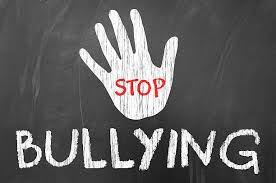From the Desk of Dr. Halley: Stop Bullying & Start Communicating
Studies indicate that around 45% of students experience being bullied at some point in school. You may remember being excluded, called names, or pushed around yourself. In today’s digital world, there’s a lot going on that’s invisible. As a parent, you want to help, but it’s hard to know what to do and if there is actually a problem. Here are some signs to look out for . . .
Appearing upset after using their cell phone or computer
Spending a lot of time alone in their room
A change in attitude, perhaps appearing sad, moody, aggressive or anxious
Becoming withdrawn, quiet or nervous in larger groups of people
Avoiding school, making up excuses or claiming to be sick
A sudden drop in grades or reports from teachers that they’re struggling
Lack of interest in social activities they normally enjoy
Physical indications such as cuts, bruises or damaged possessions
Some young people have violent or verbal outbursts; they may feel powerless at school but in the safety of home they can take back some of the lost power
What to do if your child is being bullied
Your child will be concerned about your reaction, so try to stay calm and make sure you thank them for telling you. It’s really important that you listen to what your child is telling and observe their behavior. Your student wants to know that you believe what they are saying and will support them through a tough time. If they are confiding in you, it means they are asking for help and support. It’s important to talk through with your child what steps you’ll take together to stop the bullying. Ask your child what he or she wants you to do to help. Sometimes the answer is to simply listen and give advice. Your child needs to know that it is not a sign of weakness to admit they’re being bullied. As a parent, you might start to feel guilty that you didn’t spot the problem earlier or act sooner. Try to remember that you have found the problem and are now taking action to help.
Often the first step is to contact either the child’s teacher or principal to alert them about the problem. PCR-I does not tolerate bullying and your concerns will be acted upon. Alternatively, building your child’s self-esteem through activities they enjoy such as sports, music, art, or drama is another way to support your student. If your child is focused on the negative, you can help them refocus on the good things in their life. Encourage them to think about things they are good at and their dreams for the future. Your child needs to know that they are loved and valued. Try to stay positive and avoid suggesting retaliation; this will only get your student in trouble.
Getting teenagers to talk to you about something that’s worrying them can be tough. These conversation starters might help:
What is lunchtime like at school? Who do you sit with?
What’s it like to ride the bus to school?
Is anyone ever left out of activities?
What do you think needs to happen at school to stop bullying?
What should parents do to stop bullying at schools?
If you had a magic wand or one wish, what would you change and why?
What are some good qualities about yourself?
What’s the best thing about your family?
What’s your biggest goal this year?
What do you think makes a good parent?
What qualities should a good parent have?
What traits do you admire about other people?
Give some of the ideas above a try and see if you can at least open the door a crack to a start on good communication with your child. It’s normal to have strong feelings about your student being bullied. What your child needs most are your love and support. Working with your school you can make your child’s school life a happier one.













 Launch the media gallery 1 player
Launch the media gallery 1 player.png)


